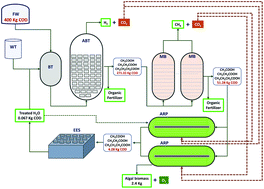Low carbon hydrogen production from a waste-based biorefinery system and environmental sustainability assessment†
Abstract
Production of low carbon biofuels and biochemicals from renewable feedstocks using a biological process is considered a sustainable alternative to the fossil-fuel-based linear economy. This study demonstrated the pilot-scale (10 m3) production of biohydrogen (bio-H2) and volatile fatty acids/carboxylic acids (VFA) through acidogenic fermentation (AF) using food waste (FW) as renewable feedstock. Bio-H2 production of 54 288 L (155.10 LH2 per kg COD) along with 25.77 g L−1 of VFA composed of acetic (HAc: 15.2 ± 1.98 g L−1), propionic (HPr: 4.89 ± 1.26 g L−1) and butyric (HBu 5.67 ± 0.96 g L−1) acids was achieved within 48 h of the fermentation period. The further acidogenic process was integrated with a biorefinery platform (methanogenesis + photosynthesis) in a circular loop strategy which helped derive multiple biobased products (CH4, algal biomass, O2 and treated water for reuse) from fatty acid-rich acidogenic effluent and untreated COD of AF. The whole bio-manufacturing unit (acidogenesis + methanogenesis + photosynthesis) converted the renewable feedstock (waste/wastewater) into fuels and platform chemicals, in analogy to a conventional oil refinery with a maximized resource recovery. The life cycle assessment (LCA) tool was employed to study the environmental impact of both the bio-H2 (standalone, ST) and waste biorefinery (WB) processes, and the results depicted that the WB approach offered a relatively low impact (approx. 3.5 fold less than ST). The approach helped determine the flow of carbon and its conversion to products; this aided the reduction of carbon emissions as well as minimized the burden on natural resources with the biosynthesis of green H2 and other value-added products, addressing carbon neutrality with bioeconomy.



 Please wait while we load your content...
Please wait while we load your content...